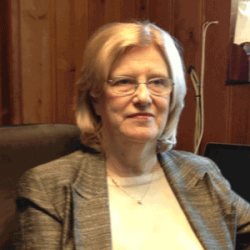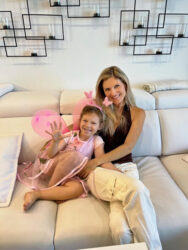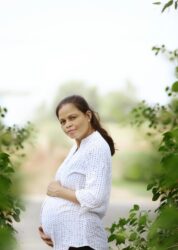Learning to Accept the Good and Forget the Guilt
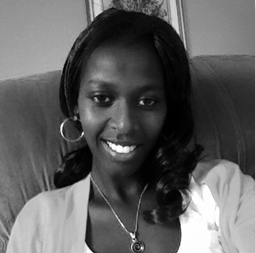
When I met Gladys Kimtai, an orphan from Kenya who had recently finished sending herself through an American college on a track scholarship, I was immediately struck by her beauty, her poise and her humble nature. When I heard her story of transformation, I felt I had to share it.
Gladys was born the youngest of six children in a small village in Kenya. Her parents died when she was two, so her grandparents raised the children in a tiny house with no beds.
“When we had food, we ate,” Gladys remembers. “Otherwise, we didn’t. We slept on cowhides by the open fire in the kitchen, underneath quilts my grandmother made out of old clothes. We had no soap, washed in the river, and drank from that same river.”
Soon after her parents died, something happened that would dramatically change the course of her life. A wealthy doctor who had grown up in the village decided that he wanted to sponsor an education for the youngest child in her family. That was Gladys. Even though she was only three years old, the doctor and his wife enrolled her in a boarding school near their home in the city of Eldoret. Gladys excelled in school, and this same family ended up sponsoring her education through high school.
“I can’t describe how unusual it was in my village for a girl to receive an education,” she says. “Usually if a family had resources, they would send their boys to school. If there was money left over, they would send the girls. But that almost never happened.”
Yet despite her good fortune, Gladys experienced a great deal of inner conflict.
She was only able to visit her family on longer school holidays, because reaching her village from the city of Eldoret required a three-hour drive in a matatu, a kind of public bus. She started forgetting her native dialect, and found it difficult to communicate with her grandmother and brothers and sister when she did come home.
Yet she didn’t feel at home in the busy city of Eldoret either. “Although I am very grateful for my education, it was also very difficult,” she says. “In the city I had three meals a day, hot, running water and nice clothes, yet I felt deeply confused about why I was being given all these gifts while my family struggled so. I didn’t feel like I belonged there.”
When she was twelve her grandparents died and her three older brothers, who were not much older than Gladys, had to quit school in order to support the family by raising livestock and growing beans and corn.
Later, as a teenager at a Catholic boarding school closer to her village, Gladys was able to relearn her native language. She wanted to be independent, so decided that after graduating from high school she would no longer accept sponsorship from the doctor’s family, yet she knew that getting a college education was the only way she could rise above poverty and have any control over her life.
By chance she heard about a Kenyan student who earned a track scholarship to an American college, and she decided that was her path to an education. The fact that she had never done any running before did not stop her.
“My friend literally held my hand and ran with me for a week so that I could learn how to run,” she says. “We recruited other friends to run together and write letters to colleges asking for scholarships. It was such a random thing. A few colleges wrote back asking us questions like, “What is your SAT score?” So then we took the SATs, and fortunately we all scored high.”
After graduating from high school, Gladys and her friends joined an ad hoc training camp in a village an hour from her home. They slept on the floor and cooked simple meals of grains and beans, training every spare moment of the day.
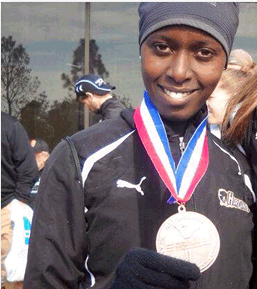
Their persistence paid off, and Gladys was offered three scholarships, including two just for academics. She ended up accepting a full track and cross-country scholarship to Harding University, a Christian school in Searcy, Arkansas. She majored in pre-med so she could become a doctor and return home to help the people of her village.
Yet Gladys continued to struggle with feelings of guilt over the good things that kept happening to her. She says, “Even though I was working on campus after class and during the summers so I could send money home to my brothers, I would cry at night because I couldn’t stop thinking, ‘No, no, no. This should be for my family, not me.’”
Worse, after completing an internship in a hospital, Gladys suddenly realized that becoming a medical doctor was not something she was cut out for. After graduation, she took a job as a hospital aide, but she knew that she had only one year to enter a graduate program or get a permanent work visa or she’d have to return home—without any real skills to offer her people.
Once again, fate intervened to change the course of her life. During her senior year she had traveled to Little Rock with a group of friends, and while standing in the hotel lobby, she met a married couple from Fairfield, Iowa, who ended up telling her about the benefits of TM.
Intrigued, Gladys called the Little Rock TM Center right away, but she didn’t have the money to pay the course fee.
A year later, with just a few months left before she would have to return home, the Little Rock TM Center called Gladys and said that a donor had paid for her to learn the Transcendental Meditation (TM) technique. The donor turned out to be the couple she had met in Little Rock the year before.
“Like many other important events in my life, TM came to me as a gift,” says Gladys. “TM changed everything. It brought in the light. The conflicting thoughts that had plagued me all my life were gone. It calmed my mind and gave me peace.”
The first thing Gladys noticed: the burden of guilt she’d carried so long lifted. “I realized that my brothers had supported me out of love, and that they weren’t expecting me to repay them with money, especially while I was still a student,” she says. “I realized that there were many other ways that I could help them.”
Gladys says she also stopped feeling guilty for the many unasked-for gifts in her life. “Now I understand that I should enjoy the amazing opportunities that come my way, since life is meant to be easy, not a struggle,” she says/
With a renewed sense of purpose, Gladys was able to take a new direction in her career and soon enrolled in a graduate degree program at Maharishi University of Management in Fairfield, Iowa.”
“After graduating I plan to take the TM Teacher Training Course so I can bring this experience of inner peace to my family—to my three brothers and sister, to my three stepbrothers, and to the doctor’s family who helped me get an education,” she says.
A believer in the power of education, ever since she came to America Gladys has made a habit of setting aside money every month to help one girl in her village receive an education by buying her books and school uniforms. Now she is in the process of setting up the Gladness Foundation to help children in need.
Gladys also hopes to become a role model for women and girls in Kenya, and is writing a memoir of her remarkable story, called Being Is Life.
“In my village everyone knows that I have gone to college, and they want to see what I can do,” she says. “I’d like to help other girls from Kenya become educated and find a way to support themselves. I think learning TM will help them to achieve what they want in life. That’s something I can give to them, something valuable that I can bring back to my family, my village and my country.”
Visit Gladys’s website at http://www.beingislife.com.
About the Author
Linda Egenes writes about green and healthy living and is the author of six books, including The Ramayana: A New Retelling of Valmiki’s Ancient Epic—Complete and Comprehensive, co-authored with Kumuda Reddy, M.D.
More Posts by Linda
- Tired and Burned Out? Transcendental Meditation Can Help: An Interview with Dr. Nancy Lonsdorf, MD
- Worried About the Future? Six Ways to Calm Your Anxiety
- What Do You Carry in Your Self-Care Tool Kit?
- Five Strategies for Family Caregivers
- From the Streets to College in Four Months: The Communiversity of South Africa Empowers Underserved Youth in Cape Town

